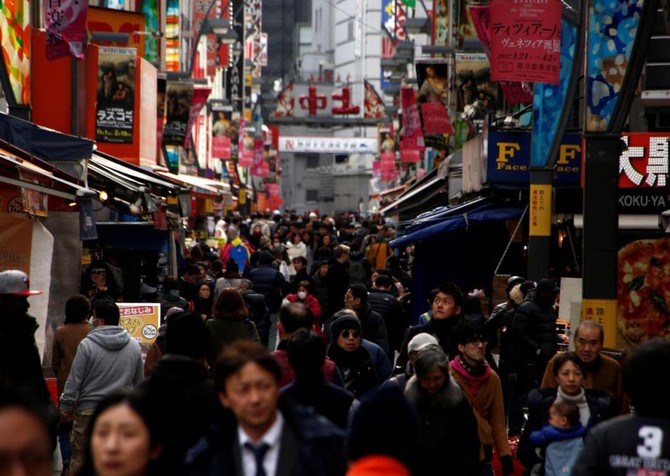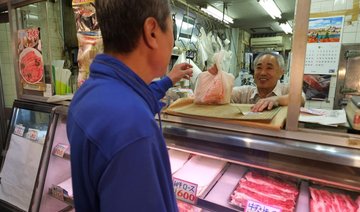TOKYO: The Japanese government raised its assessment of industrial production for the first time in a year in further evidence of an economy growing at a steady pace, thanks to a strong tailwind of upbeat external demand.
That positive impulse to growth was also underscored by the government’s upgrade of capital expenditure, the first in six months and signaled booming earnings for Japan Inc.
The monthly economic report for December backs revised data earlier this month that showed the world’s third-biggest economy grew twice as fast as originally estimated in the third quarter, bolstered by a business spending splurge and buoyant exports.
It also marked the seven straight quarter of expansion for the economy, the best uninterrupted run of growth since 1994.
The Cabinet Office left unchanged for the seventh month in a row its moderately upbeat overall assessment that the economy remains on a recovery path helped by consumer spending and business investment.
“Japan’s economy continues to recover moderately as a trend,” it said.
Industrial output is “gradually expanding,” the government said, an upgrade from last month’s assessment that output is “recovering.”
It said capital expenditure is also “gradually expanding,” a more positive view from November supported by increased investment in hospitality and manufacturing.
The value of capital expenditure in the third quarter exceeded the peak seen before the global financial crisis, which is a sign that business investment has recovered, a Cabinet Office official told reporters.
The government retained its view on private consumption, saying it is “picking up moderately,” and similarly on trade it kept intact its assessment that exports are “picking up.”
Moving the other direction, the housing sector was downgraded — the first such lowering in almost a year due to a decline in construction of homes and flats.
The overall thrust of the report ties in with a flurry of data over the past month or so showing Japan’s economy is humming along nicely, an encouraging sign for policy makers as they try to vanquish years of falling prices and sub-par growth.
Japan’s government is expected to approve on Friday a record ¥97.7 trillion budget for the 2018/19 fiscal year, government sources.
The budget will spend more money on childcare and vocational training to keep more workers in the workforce and keep the economy growing into next year.
Japan government raises assessment of industrial production in nod to growing economy
Japan government raises assessment of industrial production in nod to growing economy

Saudi banking sector outlook stable on higher non-oil growth: Moody’s

RIYADH: Saudi Arabia’s banking sector outlook remains stable as stronger non-oil economic growth and solid capital buffers support lending and profitability, Moody’s Ratings said, forecasting continued expansion despite liquidity constraints.
In its latest report, credit rating agency Moody’s said the Kingdom’s non-oil gross domestic product is projected to expand by 4.2 percent this year, up from 3.7 percent recorded in 2025.
In January, S&P Global echoed a similar view, saying banks operating in Saudi Arabia are expected to sustain strong lending growth in 2026, driven by financing demand tied to Vision 2030 projects.
Fitch Ratings also underscored the healthy state of Saudi Arabia’s banking system last month, stating that credit growth and high net interest margins are supporting bank profitability in the Kingdom.
Commenting on the latest report, Ashraf Madani, vice president and senior credit officer at Moody’s Ratings, said: “We expect credit demand to remain robust, but tight liquidity conditions will continue to limit the sector’s lending capacity.”
Madani added that operating conditions in Saudi Arabia will continue to support banks’ strong asset quality and profitability.
“The operating environment for banks remains buoyant, underpinned by a forecast increase in non-oil GDP growth, robust solvency and continued progress toward the government’s economic diversification goals,” he added.
Moody’s said authorities in the Kingdom are introducing business-friendly reforms to bolster investment and private sector activity, while implementing key development projects and preparing for major global events.
Saudi Arabia continues to advance reforms including full foreign ownership rights, simplified capital market registration procedures and improved investor protections, which could accelerate credit growth to 8 percent this year.
Problem loans are expected to remain near historical lows at around 1.3 percent of total loans, supported by ongoing credit growth, favorable operating conditions and lower interest rates, which collectively strengthen borrowers’ repayment capacity.
Retail credit risk remains controlled in Saudi Arabia because most borrowers are government employees with stable income streams.
“Concentration of single borrowers and specific sectors remains high although the growing proportion of consumer loans — now nearing 50 percent of overall sector lending — continues to reduce aggregate concentration risk,” added Moody’s.
The report said profitability is expected to remain solid among Saudi banks, supported by sustained loan growth and fee income.
Margins are expected to remain stable despite lower asset yields as banks take advantage of credit demand to widen loan spreads on existing and new lending.
Moody’s expects net income to tangible assets to remain stable at 1.8 percent to 1.9 percent this year.
The report added that Saudi banks benefit from a very high likelihood of government support in the event of any failures.
“We assume a very high likelihood of government support in the event of a bank failure. This is based on the government’s track record of timely intervention,” Moody’s said.
It added that Saudi Arabia remains the only G-20 country that has not adopted a banking resolution framework. However, it is the only Gulf Cooperation Council member to have introduced a law for systemically important financial institutions.














